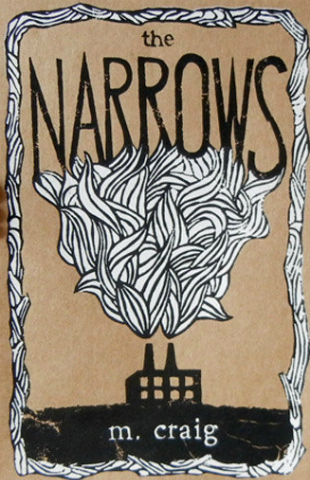
The Narrows is a Fantasy novel, but it is not the typical medieval Europe-based Fantasy. It’s what one reviewer called a “down-to-earth fantasy”. The Narrows opens with a barista making espressos using a small dragon. It’s an industrialized Fantasy world, and takes place mostly in the Bicycle Narrows, a little hipster side street in the city, taken over by cyclists, coffee shops, and illegal home breweries. The city has all the comforts you’d associate with a modern city, but all the gadgets are run on magic dust, trapped fairies are used as street lamps, and dwarves work in the factories. (Oh, and they have a pet unicorn cat! Drangs!) There are also magicweavers–people who are able to perform magic, with or without a wand–and questers, who train in a Battle School and will travel the world to fulfill quests and fight battles, for the right price. It’s the world that really drew me into The Narrows. I loved the mix of modern elements with traditional fantasy elements, and I think it makes this book worth picking up in itself. Unfortunately, the world has a 50s America view of homosexuality, with the characters frequenting a lesbian bar, but facing a lot of external oppression, including religious sanctions against being gay. It leads to a lot of gay angst and self-loathing. Personally, I prefer Fantasy worlds where queerness isn’t an issue, but sadly we still need stories like this, because it’s still a reality for a lot of people.
For the most part, I enjoyed the characters in The Narrows as well. Sim is on the run from her old life as a servant to royalty, where she got in some deep trouble. She’s a little naive and confused about the big city and spends most of the novel struggling to find her own voice and opinions about the politics that everyone around her is convinced they already know the right answers about. Most of the novel I found Sim charming, and all the main characters–her roommates and boss, mostly–well-rounded and intriguing. [spoilers] I found her treatment of Wood at the end unnecessary and even cruel, however. [end spoilers]
Sim also starts to come to terms with her sexuality over the course of the novel, as she falls for another girl, Wood. Wood is an anarchist type, proposing a unilateral revolution. I found the beginning of their relationship, as Sim flirts without really knowing that she’s doing it, really cute. [spoilers] As I said, though, I wasn’t a fan of how it ended. It begins to look like even though Sim is in love with Wood, she doesn’t seem to actually like her as a person. And then she pulls a whole “Nice Guy” move and gets really angry at Wood just because she doesn’t feel the same way about her, even though she constantly talks about dating guys, so it’s not like she was being very misleading. [end spoilers]
The pacing of the plot was a little bit weird, however, until I realized that it is setting up for a sequel. As I said, at the beginning of the book, Sim is on the run from Nogron, the powerful royal leader. After that, Sim settles into the city and the Nogron plot isn’t explicitly picked up again until near the end of the book. When I was reading it as a stand-alone novel, that seemed weird, but knowing that it’s the first part in a series, it makes a lot more sense. The middle of the book is mostly exposition and establishing the world. The Bike Narrows that Sim hangs around in is filled with hippies, queers, and fuck-the-system revolutionaries, including her love interest as well as her boss. One of the problems is in magic pollution, a metaphor that I thought got a little heavy handed at times (it’s inconclusive that magic dust use causes more lighting, but only because the three magicweavers that disagree are in Nogron’s pocket). They also talk about the prejudice against dwarves as racism. Unfortunately, I didn’t notice any people of colour mentioned in The Narrows, which I think is especially sad if you’re going for a political, oppression-based plot. One character does once mention the “White men ruling”, but that’s the only mention of race I noticed. [spoilers] Also, I couldn’t believe that in the end, they forgot about the dwarves! If you’re fighting against oppression, you should remember the existence of oppressed people, especially if you’re blowing up the buildings they work in!! [end spoilers]
The book itself is beautiful. I love the cover, and the texture of it. It’s especially impressive from such a small press. Unfortunately, I did notice some homonym typos that took me out of the story. One is that “breaks” is used instead of “brakes” through the whole book, as well as “loose” for “lose” (a personal pet peeve of mine).
Even though I had some issues with the book, overall I really enjoyed it. The world is so interesting and different from what I’m used to in Fantasy novels, and that really kept me hooked. I am excited for the sequel, which seems to be set up to be the more action-packed book after The Narrows set up the back story and established how the world works.
Check out Jill’s review of The Narrows, too!

